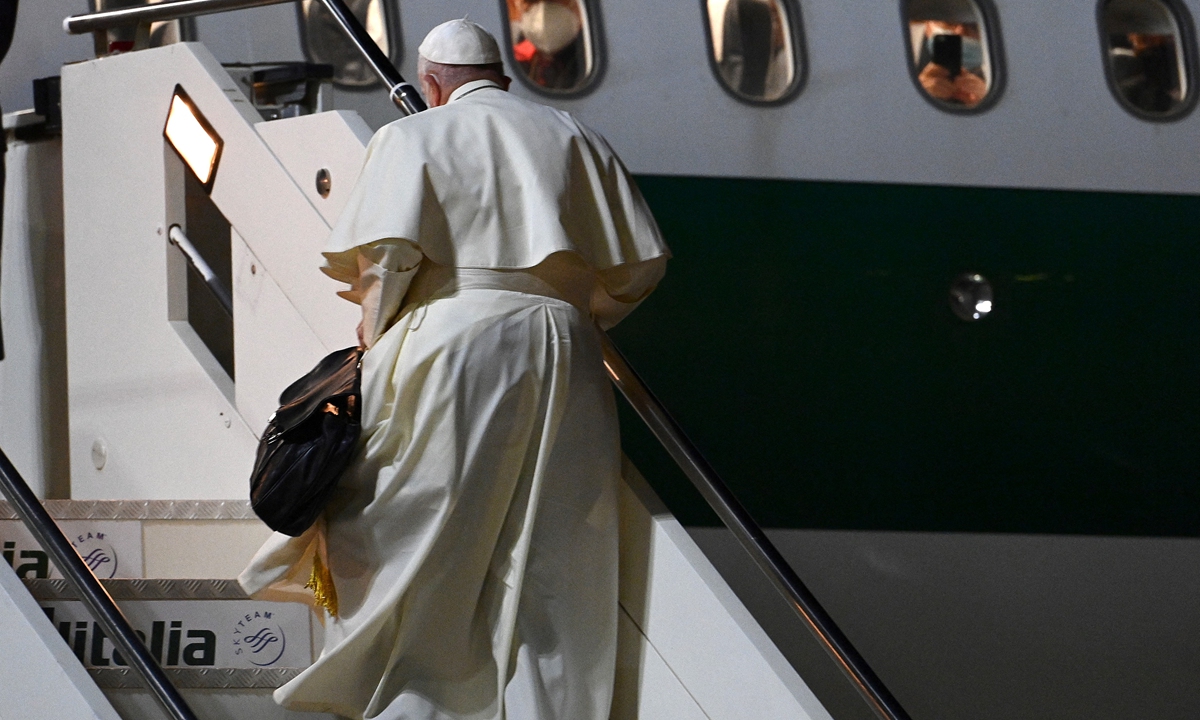The US controls about 750 bases in at least 80 countries worldwide and spends more on its military than the next 10 countries combined.

By Mohammed Hussein and Mohammed Haddad
10 Sep 2021
In the early morning hours of August 31, the last American soldiers lifted off from Kabul airport, officially ending the 20-year war in Afghanistan, the longest in US history.
At its peak in 2011, the US had approximately 100,000 troops across at least 10 military bases from Bagram to Kandahar. In total, more than 800,000 US soldiers served in the war according to the Pentagon.
While no US troops remain on the ground today, US President Joe Biden said that his military will continue to conduct air raids against enemy targets from “over-the-horizon” – air missions from a vast network of US bases around the region.
Upwards of 750 US bases around the world
According to David Vine, professor of political anthropology at the American University in Washington, DC, the US had around 750 bases in at least 80 countries as of July 2021.
The actual number may be even higher as not all data is published by the Pentagon.
With 120 active bases, Japan has the highest number of US bases in the world followed by Germany with 119 and South Korea with 73.

US military base sites fall under two main categories:
Large bases or “Bases”: Defined as military installations larger than 4 hectares (10 acres) or worth more than $10 million. These bases typically have in excess of 200 US military personnel. 439 or 60 percent of the US’s foreign bases fall under this category.
Small bases or “Lily Pads”: These bases are smaller than 4 hectares(10 acres) or have a value of less than $10 million. These include cooperative security locations and forward operating sites. The remaining 40 percent of US foreign bases fall under this category.
According to global US military deployment data published in the Conflict Management and Peace Science Journal, the US had around 173,000 troops deployed in 159 countries as of 2020.
Like the US bases, the countries with the most number of US troops include Japan with 53,700, Germany with 33,900 and South Korea with 26,400.
US military presence in the Middle East
According to the Watson Institute at Brown University, between 1.9 and three million US service members have served in Afghanistan and Iraq since 2001, with over half of them deployed more than once.
The largest US military installation in the Middle East is the Al Udeid Air Base, located west of Doha, Qatar. Established in 1996, it hosts around 11,000 American and coalition service members. Covering an area of 24 hectares (60 acres), the base accommodates almost 100 aircraft as well as drones.
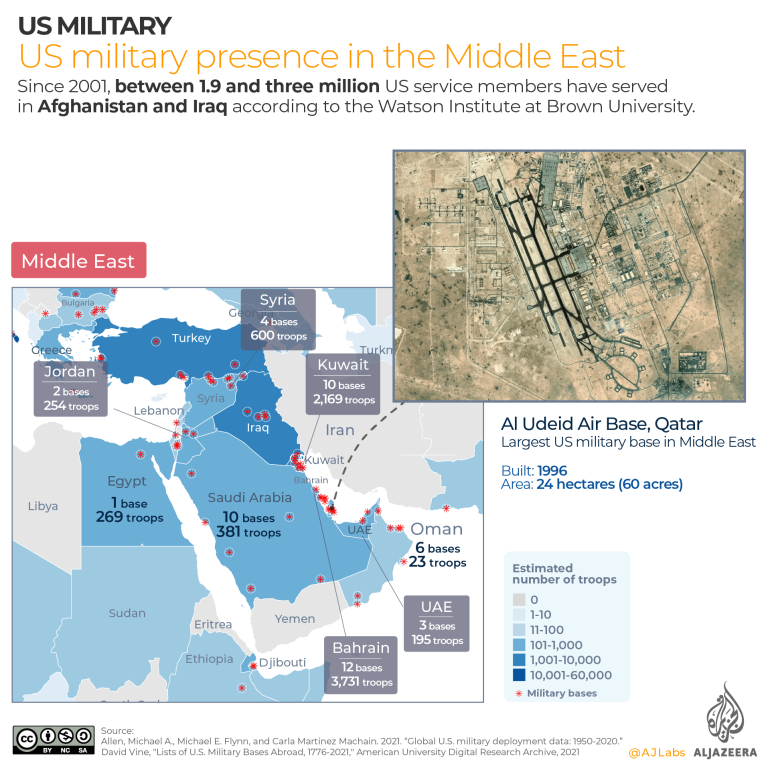
On October 7, 2001, the US under President George W Bush invaded Afghanistan following the 9/11 attacks. The coalition he led accused the ruling Taliban regime of harbouring Osama bin Laden, the al-Qaeda leader who claimed responsibility for the attacks.
An estimated 241,000 people have died as a direct result of the war since 2001, according to the Costs of War project at Brown University. In addition, hundreds of thousands more, mostly civilians, have died due to hunger, disease and injury caused by the devastating war.
In 2003, the US invaded Iraq after it accused long-time Iraqi leader Saddam Hussein of having weapons of mass destruction – none was found. At its peak in 2007, the US had an estimated 170,000 troops in the country. Today, there are around 2,500 US troops in the country as part of a security agreement with the Iraqi government.
US military presence in Japan and South Korea
The US has been in Japan since the end of World War II (1939-1945) and in South Korea since the Korean War (1950-1953).
Nearly half of all US military deployed abroad, some 80,100 American personnel, are stationed in Japan with 53,700 and South Korea with 26,400.
South Korea hosts Camp Humphreys, the largest overseas US military base, located approximately 65km (40 miles) south of the capital Seoul.
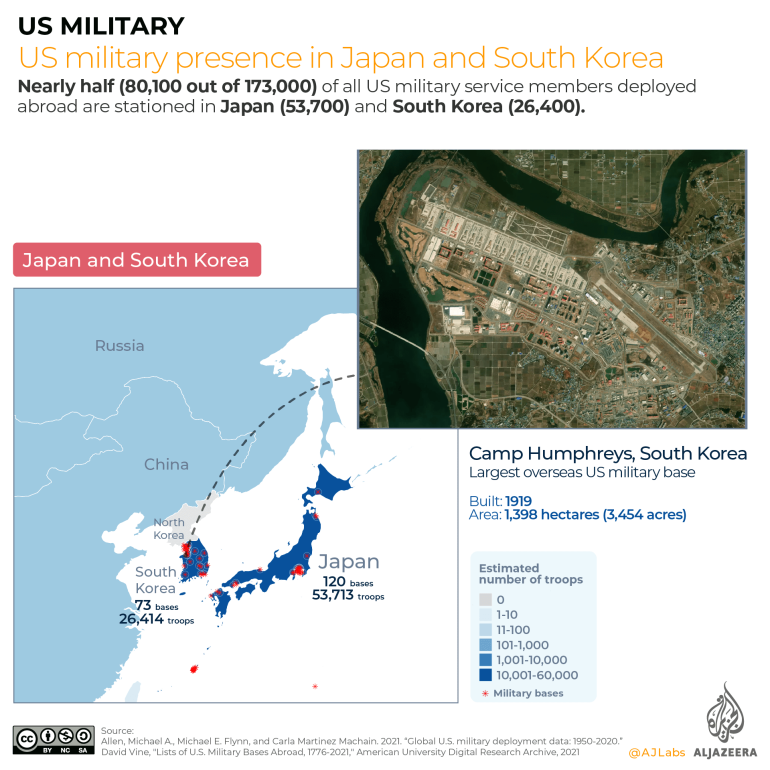
The 1,398 hectares (3,454 acres) base is one of 80 bases in the country and is less than 100km (60 miles) from the heavily fortified demilitarized zone that demarcates North Korea from South Korea.
US military presence in Europe
Europe is home to at least 60,000 US troops. At 33,900, Germany has the highest number of US troops in Europe – and the second highest in the world – followed by Italy at 12,300 and the UK at 9,300. However, the number of US troops stationed in Germany has more than halved between 2006 and 2020, dropping from 72,400 to 33,900.

The Ramstein Air Base in Germany is the largest hub for US troops and military supplies in Europe. Just outside the 1,200 hectares (3,000 acres) base is the Landstuhl Regional Medical Center, the largest US military hospital outside the US. The facility was used extensively during the Afghanistan and Iraq wars and treated thousands of wounded soldiers.
Like nearly all US bases, Ramstein is equipped with hospitals, schools, power stations, apartment complexes and a host of amenities often referred to as “Burger Kings and bowling alleys”.
US military presence in Latin America
Located on the eastern tip of Cuba, the Guantanamo Bay naval base is the US’s oldest overseas military base. The 116sq km (45 sq miles) facility has been under American control since the end of the 19th century.
The base is a hotly debated issue between the US and Cuba. For decades, Cuba has insisted that the US hand back the territory it took by force in 1898 and subsequently leased permanently in 1903.
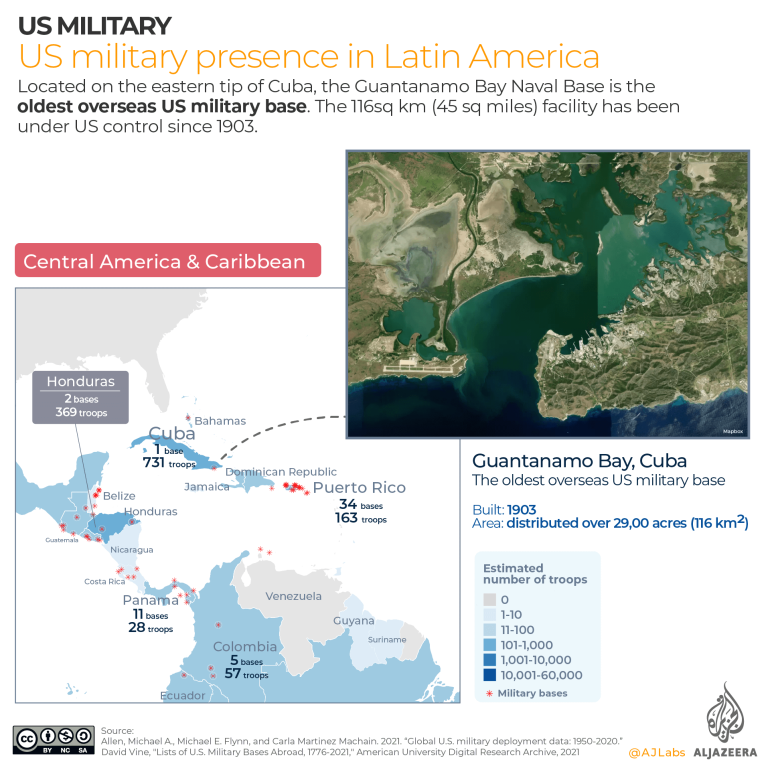
US troop deployment since 1950
Over the past 70 years, the US military has been deployed to more than 200 countries and territories.
The infographic below shows a brief history of where the US has deployed its troops since the end of World War II, along with the wars it has fought in.
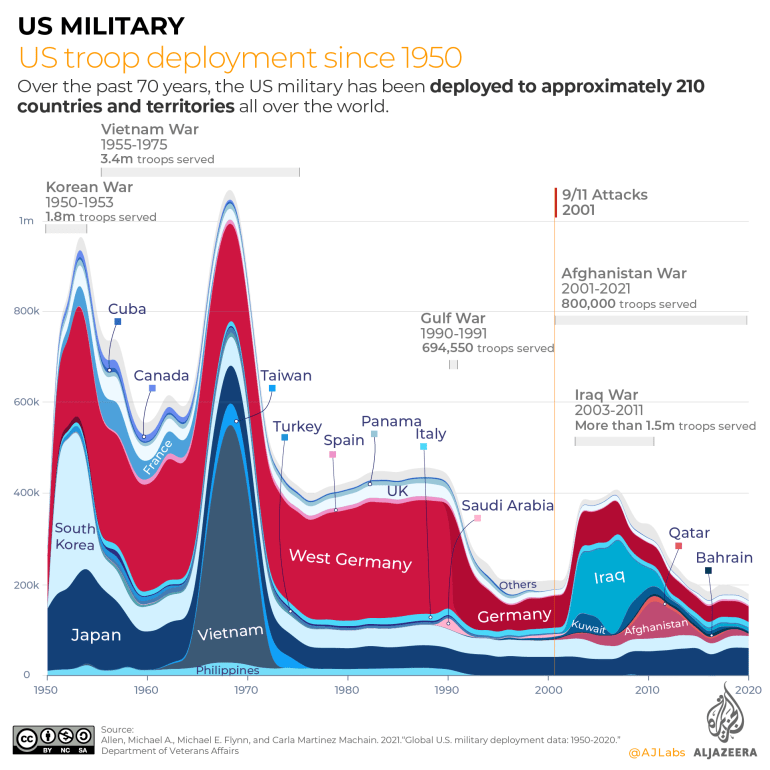
1950-1953
Following the surrender of the Japanese to the Allies that ended World War II, the US and the Soviet Union divided Korea, which had been under Japanese rule, along the 38th parallel, roughly bisecting the Korean peninsula.
On June 25, 1950, North Korean forces, backed by China and the Soviet Union, invaded the South triggering the start of the Korean War. Allied with the South, the US deployed some 1.78 million troops over the three-year-long war.
It is estimated that between 2 to 3 million civilians died during the war. According to the US Department of Defense, the US suffered 33,739 deaths in battle. No formal peace treaty was ever signed.
1955-1975
Tensions between the US and the Soviet Union continued to brew in Southeast Asia in the 1950s and 1960s. The main conflict pitted the communist government of North Vietnam against South Vietnam and its ally, the US.
Over 3.4 million US troops were deployed to Southeast Asia; in excess of three million people, including over 58,000 Americans, were killed in the war.
On March 29, 1973, the last US combat troops left Vietnam. Two years later on April 30, 1975, communist forces seized control of South Vietnam and ended the war.
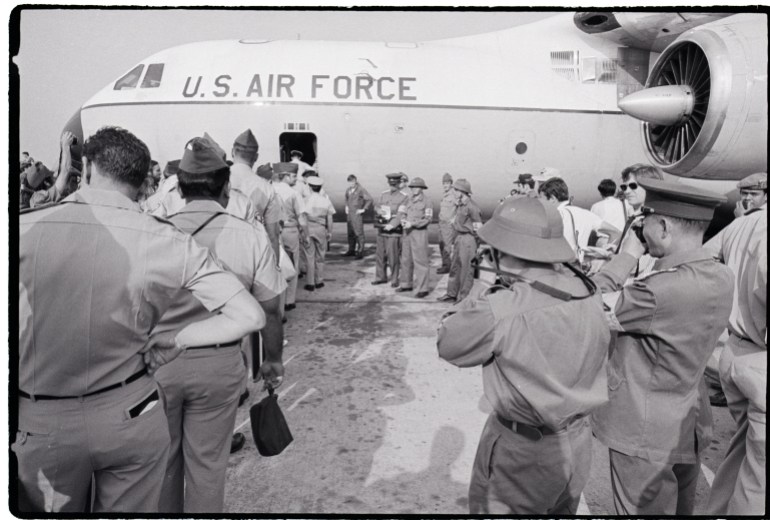
1990-1991
On August 2, 1990, the Iraqi army invaded Kuwait, a small oil-rich nation to the country’s south. One week later, on August 9, the US began Operation Desert Shield, and deployed thousands of troops to Saudi Arabia.
During the brief war, around 694,550 American troops were deployed to the region. On February 28, 1991, US President George HW Bush declared a ceasefire, and on April 3 of that same year, the UN passed a resolution formally ending the conflict.
2001-2021
The period following the 9/11 attacks, and the declaration of war on both Afghanistan in 2001 and Iraq in 2003, saw a large spike in troops abroad. At least 800,000 Americans served in Afghanistan and more than 1.5 million in Iraq over the past 20 years.
The human cost of the wars is estimated to have killed more than 900,000 people – mostly civilians

US military spending since 1950
In 2020, the US spent $778bn on its military – the largest military spender in the world and more than the next 10 countries combined – according to the Stockholm International Peace Research Institute (SIPRI).
China ranked second at $252bn, followed by India at $73bn, Russia at $62bn and the UK at $59bn.

Over the past 20 years alone, the US has spent $8 trillion on its so-called “global war on terror” according to the Costs of War project at Brown University. The war in Afghanistan accounts for $2.3 trillion which, according to Brown University researchers, equals more than $300 million a day for 20 years.
$2.1 trillion was spent on the wars in Iraq and Syria, and $355bn was attributed to other wars. The rest of the money includes in excess of $1bn in interest payments for the huge amounts of money borrowed to fund the wars as well as more than $2.2bn in obligations for veterans’ care over the next 30 years. This means that, even after the US has left Afghanistan, it will continue to pay for the wars for years to come.
SOURCE: AL JAZEERA




